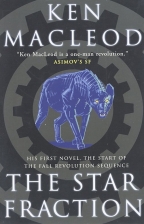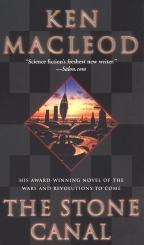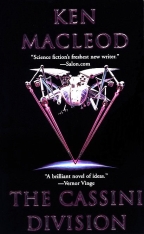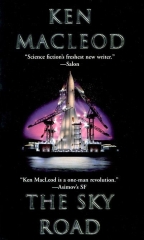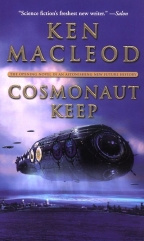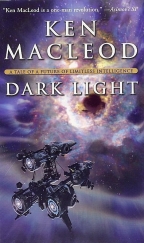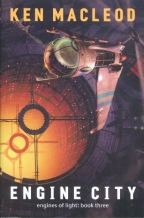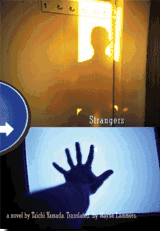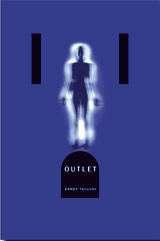The Real Macleods
&
A Vertical Strategy
The Agony Column for July 12, 2003
Commentary by Rick Kleffel
If reading stupid reviews of even stupider movies has not turned
your brain to guava jelly, it's time to go back to the books and get
some decent input. I promise not to froth at the mouth too much.
Really. I'm not going to rant on about how critics who are too stupid
to understand the plots to summer blockbuster movies probably require
assistance to guide forks full of food to their faces. Really.

|

|
|
Forget the fakers -- these are the real deal writers
who can entertain the heck out of those who are willing to
read a book. On the left above is Ian R. Macleod, author of
'The Light Ages'.
|
Ken Macleod looks a lot happier than you might expect
the author of 'Engine City' to look.
|
Instead, I'm going to accentuate the positive and in a summer when
you can read back-to-back Scottish Socialist Science fiction writers
with the same name, well who needs the silver screen, the
plasma screen, or any screen whatsoever, other than the screen upon
which you're currently reading this column. I had the distinct
pleasure of enjoying the work of two writers I've been following
separately for a long, long time, and whom I've never had the
pleasure of connecting until this summer. That would be Ian R.
Macleod and Ken Macleod, who both have recent novels out of
substance, style and utterly opposite effect. Ian R. Macleod's
'The Light
Ages' is a gorgeous, rich tapestry of beautiful prose, original
speculation and complex characters caught in a melancholy life of
work. Ken Macleod's 'Engine
City', the conclusion of his 'Engines of Light' trilogy, is a
lucky-bag stuffed full of ideas, characters, legends and humor then
compacted into fewer pages than the introductory portions of a
fantasy epic. But both engines run on the author's own version of
homegrown socialism, played out in the nitty-gritty of a world
re-imagined by a talented and particularly odd writer.
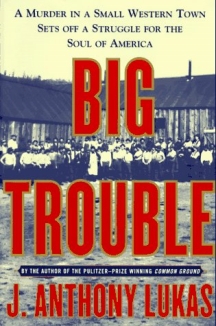
|
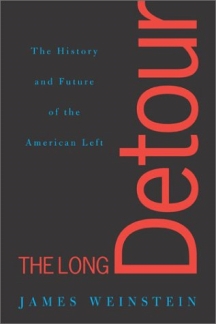
|
|
This non-fiction work is as powerful and as plotted as
a novel; it begins with the assassination of the ex-governor
of Idaho, and brings in Clarence Darrow and the Pinkerton
detectives.
|
James Weinstein documents the history of Socialism in
America.
|
Now before the carping starts, let me qualify what I say. I'm by
no means a card carrying socialist, though I was more than ready to
join after reading J. Anthony Lukas's 'Big Trouble'. This gripping
story of the battle between mining corporations and the unions in
turn-of-the-twentieth century Idaho is also the story of how
socialism was crushed in America by an effective partnership between
a fearful government and greedy corporations. Sound familiar? Well,
you can fast forward to today to read James Weinstein's 'The Long
Detour', an effective overview of socialism in America. Lukas's work
reads like a gripping, epic novel and will stir your soul, or
depending on your politics, inspire you to toss it across the room.
It's hefty enough that you should also expect damage to the impact
area. You can also expect damage to your brain; you won't think of
yourself, your country or your corporate sponsors in the same way
ever again. So compared to anyone who really knows anything about it,
I'm very lightweight. Neither of the Real Macleods may be
card-carrying socialists; they may not even like socialism. But to me
their books walk like socialists and talk like socialists;I'm calling
the books socialist.
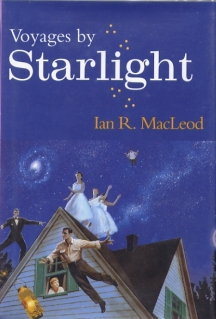
|
|
This collection came my way via the Arkham house
auto-buy policy.
|
My first contact with either of these writers was when I picked up
Ian R. Macleod's short story collection, 'Voyages by Starlight'. It
came to me via my auto-buy policy for anything from Arkham House, a
policy that's served me well for years. 'Voyages by Starlight' was a
strong indicator of what we could expect in forthcoming novels from
this writer. Macleod creates so confidently that any story of his
could be described to fit within just about any sub-genre of
speculative fiction - science fiction, fantasy or horror. What unites
them all is Macleod's careful prose. This doesn't mean that he writes
frilly literary prose for each and every story, but rather that he
adapts the language to the story being told. In '1/72nd Scale', the
language is simple and straightforward to match the story of a boy
trying to live up to his dead brother's legacy. But when Macleod
wants to get lyrical, watch out, or more pertinently - bring out your
singers. You'll want to hear the full-voiced richness of such pieces
as 'The Giving Mouth' read aloud. And you're lucky enough that you'll
be able to find this book with relative ease.
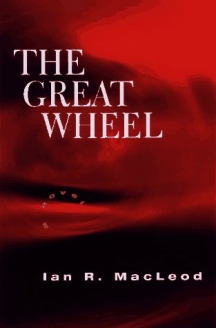
|
|
Ian R. Macleod's first novel is a dense exploration of
disease and spirituality in a
nearer-every-damn-second-future Africa.
|
Busy with the intransigence of everyday life, I missed Ian R.
Macleod's first novel, 'The Great Wheel' and rather forgot about him
until I laid my hands on 'The Light Ages'. Here was another case of
me digging up an author's old books even before I'd finished the new
ones. Fortunately, I was able to go to a very nice vendor, Von Thiel,
who had sent me stuff in the past, and he had 'The Great Wheel' at a
very reasonable price, in a brand new first-edition hardcover. 'The
Light Ages' meanwhile beckoned and it should beckon to all readers.
It's a seriously beautiful novel.
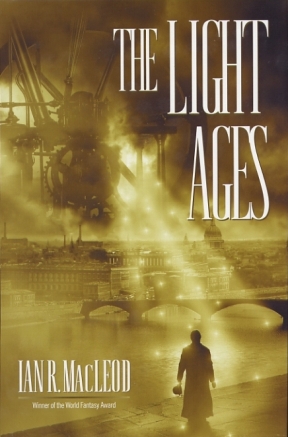
|
|
Buy this novel now while the first editions are still
cheap. For an example why, check out the costs of hardcover
first editions of 'Perdido Street Station'.
|
For those who try the first-page prose test (which I admit isn't
something I often try), 'The
Light Ages' will be a very easy buy. Macleod's gorgeous prose
rises from the page and coalesces into a gorgeous painting right in
front of your eyes. His story of an alternate England powered by a
uranium-like substance of flesh-warping power called aether, is
achingly melancholic. He creates a world so detailed, so full that
it's easy to feel the passion of his carefully crafted characters.
This is a world of great injustice, where the gap between the rich
and the poor is positively astronomical. In other words, it's much
like our world. Ian R. Macleod's socialist bent is that of the
passionate on-the-street believer. Robert Borrows, the first person
narrator of 'The Light Ages' is a pamphleteer, a ranter and raver in
the most primitive sense of the word, railing against -- the Guilds.
Macleod creates an interesting dissonance by defining his fiscal
aristocracy through 'The Guilds'. For most modern readers, the word
"guild" has the connotation of a union, and thus a populist entity.
But in Macleod's world, the Guilds are used to create the hierarchy
that keeps the rich separated from the poor, much in the way
corporate entities do in our world. In our world, the unions at least
would like to have the average joes believe that they stand between
us and corporate domination. In Macleod's world, nothing stops the
Guilds from dominating all wealth. Robert Borrows moves from the
aether-mining town in which he was born to the big city and starts
calling his comrades "Citizen". 'The Light Ages' shows Macleod to be
a world builder of supreme skill and a writer with a powerful voice
-- a powerful Scottish socialist science-fictional voice. He claims
on his website
to be "well past what I'd like to think is the half-way point of my
next novel, Electricity...Electricity is set in the same world as
'The Light Ages', but almost a century further forward in time,
which, by their slow technological progress, means that things have
moved forward by perhaps ten or fifteen years." If you want to talk
about highly anticipated sequels, this would be one.
Ken Macleod's 'Fall Revolution' series is a dense evocation of a
confusing and complex future.
On the other side of the spectrum is Ken Macleod, also Scottish,
socialist and a science fiction writer. Other than that, no
similarity. Well, the name, but -- Ken Macleod has been on my radar
since the US release of 'The Stone Canal'. The 'Fall Revolution'
sequence of novels should be read in the proper order if you're going
to have a hope of understanding what's going on, so here you go: 'The
Star Fraction' is first, with the birth of world chaos and an online
AI, followed by 'The Stone Canal', 'The Cassini Division' and
finishing up with an elegiac 'The Sky Road'. Ken Macleod writes books
that are so packed with ideas, reading one is like picking up a
handful of needles. He'll start in the recent past, with bullshitting
socialist wannabes hanging about and philosophizing while getting
hornswoggled. Before you know it, they're building working versions
of the traditional flying saucers ("gravity skiffs") and popping off
to live in harmony on an alien earth with Bigfoot ("gigants") and
Grey Aliens ("saurs").
The 'Engines of Light' series features Fortean and socialist
themes played out across a wonderfully detailed
universe.
The is just a small part of what happens in his latest series,
called 'Engines of Light', which consists of three novels, 'Cosmonaut
Keep', 'Dark
Light' and 'Engine
City'. Ken Macleod is a guy who likes to have a lot of fun with
ideas, characters, settings and his vast imagination. He's also a guy
who has the wit to have this fun in highly compacted novels that are
chock-a-block full of humor and bristling with life to the point
where you might need a scorecard to keep track of who is in love with
who and what planet they're on at any given moment. As a science
fiction writer, Macleod is too-sharp-kitchen-knife sharp. You might
injure your brain as you slide between the clever ideas that he
serves up like razor blades for the soft-skinned. Most importantly,
he has a sense of humor about all this stuff he packs into his
novels. About the 'Engines of Light' series, he told me that he "may
write a sequel to the series in which some people from subsequent
generations go adventuring off along the paths opened by the
dissident god's map of the galaxy...but mention it's not going to be
soon.." I really loved the universe he created in this series, and
I'd really like to see where he goes with it. But whatever he offers
up, I'll be among the first in line to buy.
Alas, getting the Ken Macleod titles in untouched first editions
is going to set you back a few samolians but it's definitely worth
it. If you're not so inclined, most of them can now be had as
domestic paperbacks on either side of the ocean. In any event, if
you've not tried out Macleod's utterly unique brand of chaotic
socialism, get out of your sandwich sign and into the bookstore. Good
socialists are supposed to read.
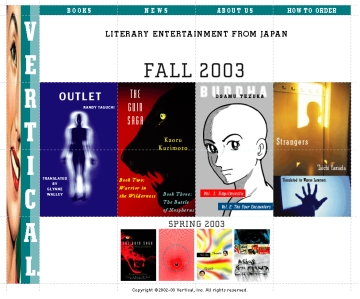
|
|
The Vertical-Inc Home page features their latest
releases from Japan.
|
Good capitalists, on the other hand, are supposed to make money. A
publisher I've been looking at fairly closely of late seems to have
very intriguing plan for doing just that, and doing so by publishing
books that even good socialists might want to read. Vertical-Inc came
into my purview when I picked up their publication of Koji Suzuki's
'Ring'. In picking
your reading, it's nice to find publishers who consistently publish
stuff you like; it makes experimentation a little less costly and a
little more likely to lead to the purchase of a book you like. It's
often rather hard to get a good bead on what kind of books to expect
from a particular publisher, however, since most publishers calibrate
their output based on editorial choices made by a group of editors
whose choices can be totally idiosyncratic. That's why I found it
rather refreshing and interesting to see what they're doing over at
Vertical-Inc.
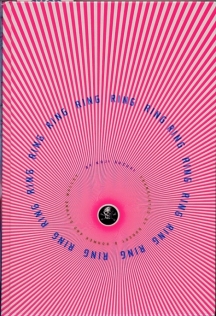
|
|
Koji Suzuki's 'Ring' is an intense novel of
technological, supernatural and mathematical terror.
|
I wrote the folks over at Vertical-Inc to find out if they'd be
releasing the sequels to 'Ring' by Koji Suzuki. I liked that novel
well enough to want to buy the author's other works, particularly the
two sequels to 'Ring', 'Spiral' and 'Loop'. Suzuki brings an
interesting dispassionate mathematical point-of-view to his
techno-horror. I also enjoyed the Chip
Kidd book design. Micah Burch wrote me back and informed me that
they were in the process of translating the two sequels, and
suggested that I might find their publication of 'Guin Saga'
interesting, and that Chip Kidd was in charge of their art. It was
then that I took another look at the Vertical-Inc website.
In the first place, the web
site is fairly nicely designed. It loads quickly, at least. But
the Vertical -Inc strategy is nothing less than brilliant, especially
in these uncertain financial and reading times. Vertical-Inc's plan
is to translate and publish the best of the most popular Japanese
fiction. Here's what they say on their website:
"Vertical,
Inc., is a unique new publisher specializing in
translating the best contemporary Japanese books. We
select our popular novels, graphic novels, and quality
nonfiction from a rich, variegated stock: Japan's huge
and vibrant book market. "
"In fields like animation
and video games, Japanese entertainment thrills people
worldwide. The Japanese book world's offerings are
equally entertaining. Until now, however, most
Japanese books translated into English have been
either literary classics or introductions to
traditional culture meant for a limited circle of
Japanophiles. Vertical publishes exciting titles that
require no prior knowledge of Japanese culture and are
not intended primarily to familiarize readers with it;
we choose good reads with universal themes.
"
Here's a publishing company that's got a huge backlog of
bestselling titles queued up and ready to go. They have no pesky
writers to deal with; the writing aspect is a done deal. The books
have all been test marketed and proved profitable. They've all been
heavily reviewed. Now in most cases, publishing is really a hit or
miss proposition. Great works are often wasted upon the great
unwashed. But what Vertical-Inc has done is give itself access to a
huge body of ready-made and more importantly, ready-to-sell-big
titles. It's a pure and simple and rather mind-boggling inspiration.
They get themselves a couple of translators, a great art director,
publish fabulous books that sell well and they don't have a huge
out-of-pocket expense. There's a huge audience for entertainment that
originates from Japan, and a huge audience for simply good
entertainment. There's no market research required. What this means
is that they may be able to stay the course and keep publishing until
they work out all the kinks of this strategy and are able to
seamlessly and effortlessly hand over book after brilliant book.
This said, 'Ring' is a pretty great start, though it's clearly
going to play to smaller audiences this time around. But think of the
great strategy; here's the book upon which two huge hit movies were
based, 'The Ring' and 'Ringu'. Now, both these were out before the
book. But the novel sequels should be out before the English-language
versions of the sequels are made and before the Japanese versions are
available in a decent domestic DVD. Thus, the sequels are pre-sold to
an ever-growing audience. That's a publisher that's smart and
profitable. We need more.

|
|
This image by Chipp Kidd will be formed by the spines
of the Vertical-Inc hardcover releases of Osamu Tezuka's
'Buddha'.
|
I asked Micah what else was up at Vertical, and he told me about
'Buddha' by Osamu Tezuka. Tezuka is apparently the 'father of manga'.
This is the 8-volume story of Siddhartha told in manga-style with
hardcover editions designed by Chip Kidd. It sounds wonderful and is
potentially a very important publication. At this point in time,
manga is pretty much the province of Comic book emporiums. Yes, you
get a lot of notice about its importance, but if you actually want to
find it, you have to go to a comic book store. There, you'll find
yourself confronted by a confusion of comics that only a pro can sort
through, and most plain-old book readers just can't be bothered.
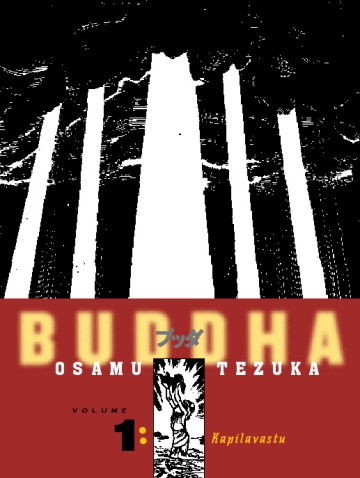
|
|
Will Osamu Tezuka's 'Buddha' usher in an age of
respect for Manga in the US?
|
The Vertical-Inc version of 'Buddha' is manga that will look like
a book, walk like a book, talk like a book and be available in
bookstores. If it lives up to its reputation, and there's an entire
nation that says it will, then it should read like literature. I can
totally understand why Vertical-Inc is excited about this; they're
about to introduce US readers to manga. According to Micah, "...we
just got back the galley of our graphic novel "Buddha" by Osamu
Tezuka. We're very excited. It is, for lack of a better word,
money."
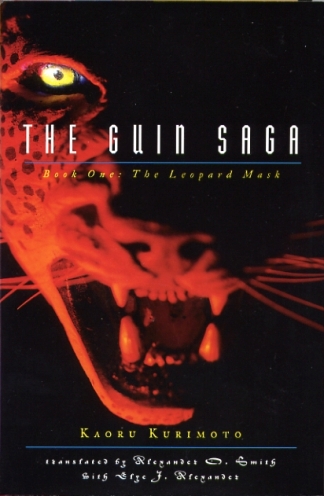
|
|
The first volume of the Guin Saga is one of a 100
volume planned series.
|
I'll say; the illustrations are gorgeous. But 'Buddha' isn't the
only trick they've got up their sleeve. There's the 'Guin' saga, an
89, no I just checked, 90 book series that was the Harry Potter of
Japan (until the heavily translated Harry moved in, one would
presume; I'm not sure who's outselling who now). Projected to be 100
volumes long, the quality supposedly varies after say the first 20.
So, 20 volumes of hardcover original fantasy, anyone? Who wouldn't be
excited at the prospect of publishing this? And I must say, I'm
interested in reading it.
Four new titles from Vertical-Inc cover a range from Cop
procedural to new-age horror.
But Vertical-Inc isn't just doing horror, SF and fantasy. Their
roster includes some crime fiction titles and other straight fiction
titles. 'Ashes'
by Kenzo Kitakata is the story of middle-aged mobster, facing a life
in mid-level management. Taichi Yamada's 'Strangers'
looks to be a bit of surreal suburbiana, while Kaori Ekuni's 'Twinkle
Twinkle' is a novel about sexual identities and masks. Randy
Taguchi's 'Outlet' is a new-age horror thriller, and like 'Ring' the
first of a series.
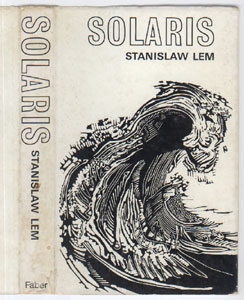
|
|
Yikes! I originally brought in the kissy cover but
before my brain could explode, I managed to get a shot of
the first edition hardcover from the 1970's. Here's a
classic novel that needs a new translation from master
Michael Kandel.
|
The whole deal is not without potential problems for both the
publisher and the reader. From the reader's perspective, there are
definitely issues with translated fiction. Stanislaw Lem is a great
writer, but his translations remain very uneven. His best stuff is
that translated from the Polish by Michael Kandel. But his most
popular and best-known novel, 'Solaris' exists only in an inferior
English translation taken from a French translation. Infuriatingly,
it's not likely to get the Michael Kandel treatment any time soon.
Vertical-Inc's hopes hang on translating and translators. 'Ring' was
ably served and relatively well-translated. For the most the part the
author's limpid style seemed to shine right through, though
occasionally you could sense the gears behind the otherwise seamless
machine. Still, Vertical-Inc will clearly get better and better with
this as time passes; it's barely an issue in 'Ring' and is not likely
to be an issue in future releases.
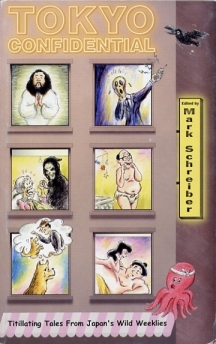
|
|
Mark Schrieber's 'Tokyo Confidential' is a very weird
and funny collection of urban-legend style stories from
Japan.
|
But beyond the raw translation of language, which Vertical-Inc
seems to have well in hand, there's the issue of cultural
translation. This is a tougher nut to crack. Earlier this year, I
came upon a book that humorously capitalized on the issues of
cultural translation titled 'Tokyo Confidential'. Here, the authors
simply related the most hysterical stories out of Japanese newspapers
and played them out like a series of urban legends for sheer
entertainment value, and they are sure as heck entertaining. Many of
the Japanese straight-fiction bestsellers might hinge on cultural
mores and prejudices that are either obscure on non-issues here in
the West. Vertical-Inc promises that they will cherry pick the best,
the most universally-themed works. These might not be as common as
Vertical would like and the process might not be as easy as
Vertical-Inc thinks.
On the other hand those cultural differences might be just what
discerning readers are after -- a true taste of the strange and
exotic. It will fit in perfectly with the genre-oriented offerings
that are more sure-fire. Vertical can offer faux-aliens and actual
aliens. In any event, Vertical-Inc is clearly a publisher with a
unique vision, an interesting set of initial products and some
intriguing upcoming projects. We'll be looking at them with great
interest, and you should as well. With Chip Kidd's easy-to-spot art
direction, it should be a no-brainer to find new Vertical-Inc
offerings in your local independent bookseller. Once again, it just
got easier to buy books. And, of course, ignore the rest of the
entertainment world. While you won't have the pleasure of frothing at
the mouth with frustration at good ideas gone bad, you may at least
enjoy your Scottish Socialism -- or your Japanese bestsellers - with
the knowledge that your brain is not being turned into guava jelly,
or indeed any condiment that might go well on toast.







